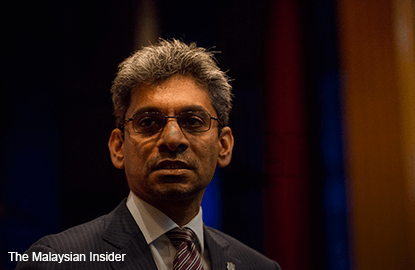
KUALA LUMPUR (March 1): The Malaysian Communications and Multimedia Commission’s (MCMC) reliance on Sections 233 and 263 (2) of the Communications and Multimedia Act 1998 (CMA) to deny public access to The Malaysian Insider (TMI) is without any basis and oppressive, according to the Bar Council Malaysia.
In a statement today, Malaysian Bar president Steven Thiru said the MCMC announced the decision in its statement dated Feb 25, to deny public access to the online news portal indefinitely without giving any specific reason.
“It is quite puzzling that anyone could consider causing public confusion to be an offence at all.
“It is also rather demeaning and offensive to assume that Malaysians will be “confused” merely as a result of contradictory statements in the press, or because the source of press statements was not disclosed,” said Thiru.
Moreover, he explained that MCMC cannot invoke Section 263(2) of the CMA for the purpose of barring public access to websites on unjustifiable grounds.
He said that as a responsible regulator, MCMC must always act in accordance with the law and must not arrogate to itself, powers that have not been conferred on it by Parliament.
“The action taken by MCMC against TMI appears to be unsustainable in law,” said Thiru.
He stressed that the recent and emerging pattern of MCMC’s reliance on the CMA to bar access to websites, is alarming.
It is seen as harassment and intimidation of the media, and targeting of contrary or dissenting voices in the public sphere, he added.
“In July 2015, the whistleblower website, Sarawak Report, was blocked for allegedly publishing unverified information relating to the Prime Minister.
“Other websites such as Medium, Outsyed the Box, Tabunginsider, Jinggo Photopages, Din Turtle, Asia Sentinel and Malaysia Chronicle, have also been blocked.
“The legality of MCMC’s action under the CMA in respect of these other websites, also appears to be questionable,” he said.
Thiru said the right to information, or the right to know, is implicit in the guarantee of freedom of speech and expression that belongs to every citizen, as enshrined in Article 10(1)(a) of the Federal Constitution.
“Indeed, a true democracy envisages a meaningful right to know. The blocking of access to websites is a serious curtailment of the right to know, as it thwarts the flow or dissemination of information, thoughts and ideas. This renders the constitutional guarantee in Article 10(1)(a), vacuous or meaningless,” he said.
Thiru added that while it is recognised that freedom of speech and expression is not absolute, any restriction of this fundamental liberty cannot be founded on any arbitrary and unlawful exercise of power by the authorities.
“This would be nothing less than a frontal assault on the rule of law.
“The Malaysian Bar urges the MCMC to abide by the Federal Constitution, respect the rule of law and immediately withdraw the prohibition of public access to the TMI online news portal,” he concluded.